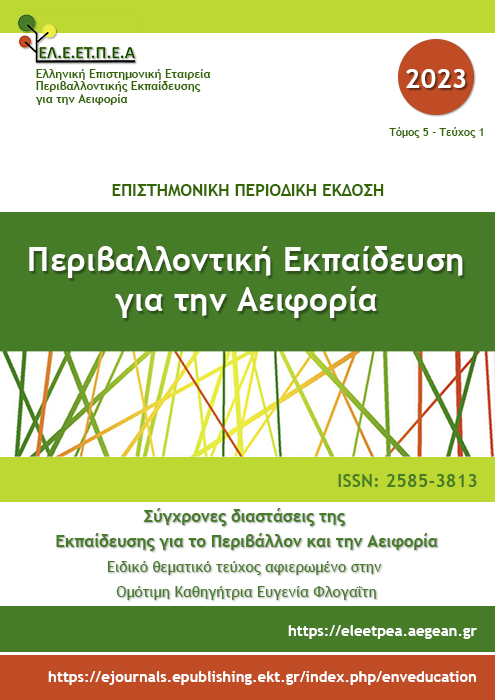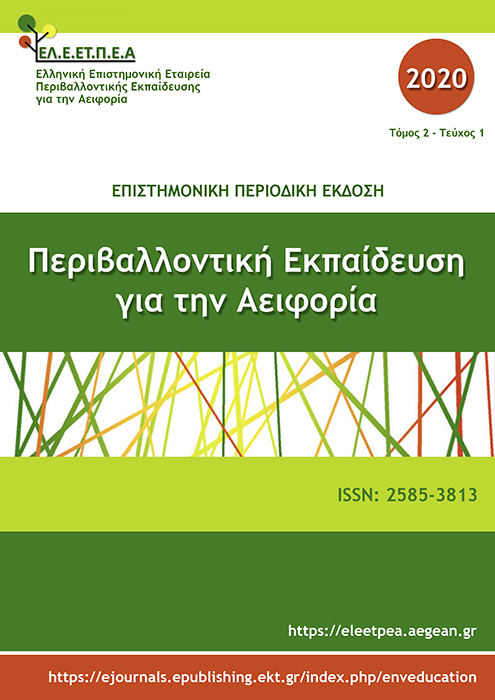Η συμβολή των βιωματικών εργαστηρίων «Παρεμβαίνουσας μη Κατευθυντικότητας» (NDI) στην ανάπτυξη αξιών και ικανοτήτων της αειφορίας

Περίληψη
Ο δρόμος της αειφορίας απαιτεί ριζικές αλλαγές σε όλες τις όψεις του πολιτισμού μας, μάλιστα στην εκπαίδευση, η οποία ίσως προκαλεί παρά θεραπεύει τα δεινά των ποικίλων κρίσεων που έχουν ξεσπάσει κατά τις τελευταίες δεκαετίες. Υιοθετήσαμε τη βιωματική/μετασχηματιστική/βαθιά εκπαίδευση και την ενσωματώσαμε στο πλαίσιο σπουδών ενός μεταπτυχιακού προγράμματος μέσα σε ένα κατάλληλα διαμορφωμένο χωρόχρονο. Η εμψύχωση της ομάδας με τη μέθοδο της «παρεμβαίνουσας μη κατευθυντικότητας» (NDI), φαίνεται να καταλύει αλλαγές στα μέλη της ομάδας, οι οποίες συμπλέουν με τις απαιτήσεις της Εκπαίδευσης για το Περιβάλλον και την Αειφορία: Αποδέχονται την προοπτική της αλλαγής της προσωπικής τους εκπαιδευτικής θεωρίας και πρακτικής. Αναπτύσσουν κριτική σκέψη ανακαλύπτοντας την προοπτική του Άλλου και φτάνοντας να τον «νιώσουν» ενσυναισθητικά. Συγκινούνται και εκφράζουν τα συναισθήματά τους. Προβληματίζονται μέσα από αυτογνωσιακές διαδρομές πάνω στη βαθιά μοναξιά και αποξένωση του σημερινού ανθρώπου από τους συνανθρώπους και τη φύση. Οδηγούνται στην αναθεώρηση όψεων της επιστημολογίας της γνώσης. Ανανεώνουν τη σχέση τους με την ελευθερία «ερευνώντας» τα συστατικά της αυτοθέσμισης και ενδυναμωνόμενες μέσα από δημοκρατικές διαδικασίες. Μεταφέρουν, τέλος, στοιχεία από τα βιώματα που έζησαν εντός της ομάδας στο οικογενειακό, φιλικό και επαγγελματικό τους περιβάλλον. Πρόκειται για μια βαθιά ανθρωπολογική μετάβαση σε μια Γη της Επαγγελίας κατοικημένη από ελεύθερους ανθρώπους.
Λεπτομέρειες άρθρου
- Πώς να δημιουργήσετε Αναφορές
-
Γεωργόπουλος Α. (2023). Η συμβολή των βιωματικών εργαστηρίων «Παρεμβαίνουσας μη Κατευθυντικότητας» (NDI) στην ανάπτυξη αξιών και ικανοτήτων της αειφορίας. Περιβαλλοντική Εκπαίδευση για την Αειφορία, 5(1), 135–151. https://doi.org/10.12681/ees.35773
- Ενότητα
- Articles

Αυτή η εργασία είναι αδειοδοτημένη υπό το CC Αναφορά Δημιουργού – Μη Εμπορική Χρήση – Παρόμοια Διανομή 4.0.
Οι συγγραφείς διατηρούν τα πνευματικά δικαιώματα και παρέχουν στο περιοδικό το δικαίωμα της πρώτης δημοσίευσης μαζί με την αδειοδότηση της εργασίας με CC-BY-NC-SA, που επιτρέπει σε άλλους να μοιράζονται αυτή την εργασία με αναγνώριση του συγγραφικού δικαιώματος και την αρχική δημοσίευση σε αυτό το περιοδικό.


